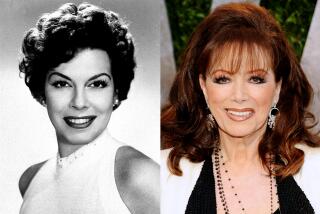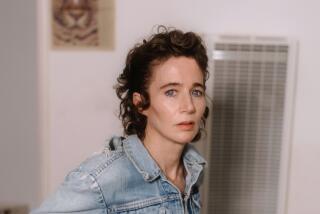Personalities of the Picaresque : Hidden parts of a woman come out in a crisis : SPLITTING, <i> By Fay Weldon (Atlantic Monthly Press: $21; 246 pp.)</i>
- Share via
A new book by Fay Weldon about the foibles of men and women coming apart--what fun! I’ve been waiting months for this! And now here it is, just in time for tanning season and full of the stuff that makes reading worthwhile--crackpot landed gentry, pert vulgar upstarts, horsey English countryside, racy London nights, shrewd insights, witty asides, sex in a cab with a driver named Ram!
New? You mean “another.” And “Ram.” That was subtle.
What do you know? You’ve only read that one other book of hers, about the she-devil. And anyway, it’s not supposed to be subtle. After all, it’s about all those hidden parts of a woman coming out as separate personalities in a crisis. Her marriage splits and she splits. You can’t say you weren’t amused when all the personalities debated what to do and who was in charge at the moment: Angelica, the toughminded one; Lady Rice, the titled wife she was; Angle, the saucy tart she wasn’t as much as she might’ve wanted; and Jelly, that office girl (and Ajax--what was he doing there?)
The multiple personality--a very clever way of addressing the divided nature of the feminine and its manifestations in the individual and in the culture. Ajax, of course, was the vestigial masculine in every woman.
Oh go back to your carrel. It’s readers like you who wreck reading for everyone. The book’s a lark and a romp.
So it’s what, an accident, that the heroine begins as a pop star in a band called Kinky Virgin? That her Angel persona is a whore? This doesn’t indicate that the author’s remapping the virgin-versus-whore territory? And I might point out that you were the one whining all the way through about inconsistencies.
I’ll leave that to you. God, they say, is in the details, and I don’t believe in either. What I’m interested in is the underlying theme, the notion of a character as a balance of conflicting internal voices, and the overarching manner of its execution, which in this case--and here we get back to the question of subtlety--is the summary style, precise in its generalizations, of fairy tale. Look at the enchanted woods from which the girl emerges. Witness the magic that allows her spirit to visit freely here and there without her body’s help. The disguises. The deceptions. The happy ending.
Yeah, what about that ending? Isn’t it overly romantic, a bit dubious, after men in the book are portrayed as such pigs?
Well, aren’t they? Other than mine, I mean. And women don’t do too well either. Consider how Susan, that slut, sleeps with every married man in the neighborhood, and somehow manages to cast the blame on the betrayed wives. Weldon may be wicked, but she’s fair. And she’s funny: a man who calls weeping a form of sexual harassment. Lines like, “ ‘You treat me like a child.’ She’d been saying that since she was twelve.” Or, “Brotherly love comes in off-peak hours.” Or, “Boffy Dee did not see brain damage as an impediment to marital happiness. On the contrary.” This is a book with someone named Boffy Dee in it. It’s a comedy. Lighten up and admit you liked it!
More to Read
Sign up for our Book Club newsletter
Get the latest news, events and more from the Los Angeles Times Book Club, and help us get L.A. reading and talking.
You may occasionally receive promotional content from the Los Angeles Times.








